Solar Installers Stevenston
Find top Solar Installers Near Me in Stevenston
Get 3 FREE Solar Companies quotes for your project today! Compare profiles, reviews, accreditations, portfolio, etc... and choose the best offer.
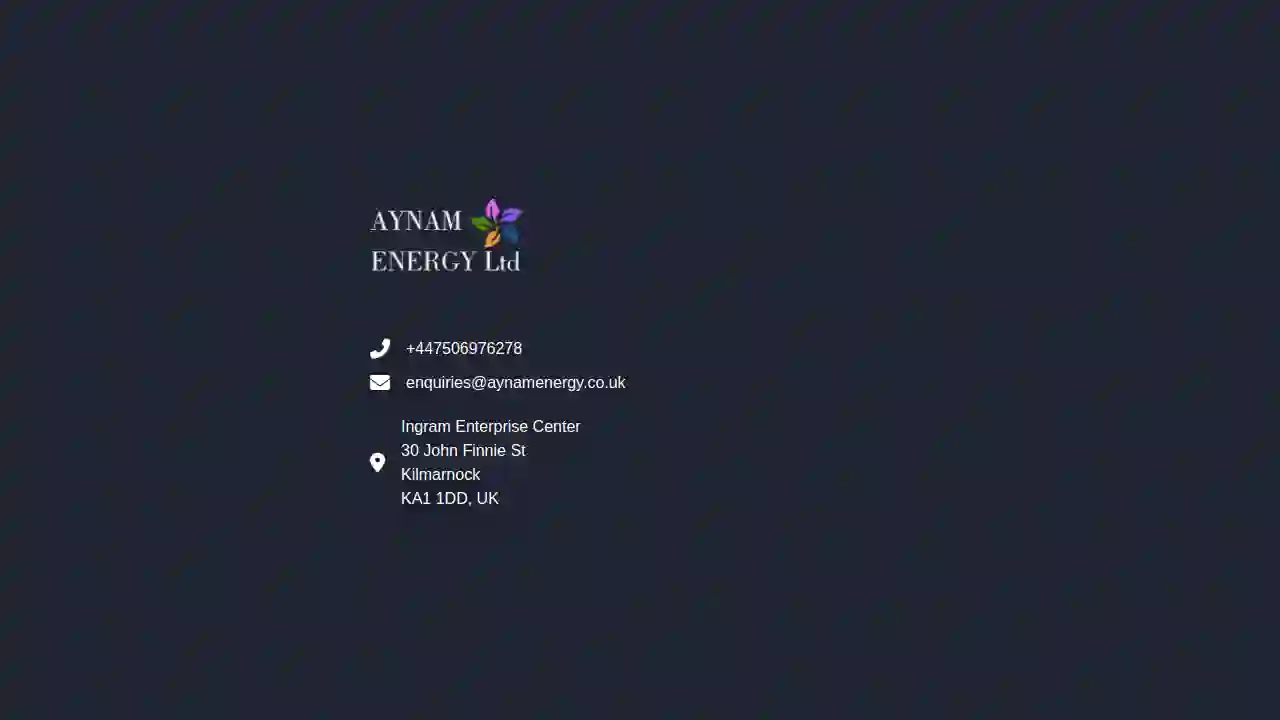
Aynam Energy Limited
Ingram Enterprise Center, 30 John Finnie St, Kilmarnock, KA1 1DD, GBAynam Energy Ltd is an expanding engineering consultancy within the building services sector that provide a comprehensive range of building energy and sustainability services and appraisals. Aynam Energy are a trusted independent energy and sustainability consultancy, providing low-carbon, cost effective solutions for the built environment. Formed by our founding Director, Yaseen Waseem, an experienced chartered Mechanical Engineer with many years of experience in the field of building energy consultancy and the use of state of the art building physics tools and techniques. His vision has led the company now provide sustainable building design solutions to projects all over the UK. Our team uses industry leading tools to provide high quality expertise to our clients and partners in the construction sector. Aynam Energy will be pushing the boundaries of sustainable and low carbon building design whilst challenging and disrupting the status quo to ensure innovative and affordable low carbon building designs can prevail. Widespread sustainable solutions must be targeted whilst maintaining functionality and occupant comfort.
- Services
- Why Us?
- Our Team
- Testimonials
- Gallery
Get Quote
Solar Edge Protection Inverness & Highland (Solar Panel Bird Proofing)
Solar Panel Edge Protection Ltd (Main Office), Balmuildy Road, Glasgow, G23 5HE, GBSolar Panel Edge Protection Ltd are Scotland’s leading solar bird, pigeon and pest proofing service, providing a long lasting robust solution with a 10 year guarantee. We have installed thousands of our 100% guaranteed solar edge bird proofing kits across Scotland including in Inverness and Highland area. We guarantee to stop birds nesting under your solar panels first time for the long term. Each year, the damage caused by nesting to solar panels amounts in millions of pounds in Scotland alone. Your solar panels and PV system is under threat, so is your wiring, your roof’s drainage system, and most importantly, your health. Let us help you maintain your solar panels and solar PV system by offering the best solar panel bird proofing solution available in the UK today. Clean solar panels means maximum solar yield and a much cleaner roof means your home looks far better. Solar Panel Edge Protection Ltd are a team of experienced and vetted solar professionals.
- Services
- Why Us?
- Testimonials
- Gallery
Get Quote
Think Solar Ltd
51 reviewsOffice 2.9, 1 Barrack Street, Hamilton, ML3 0DG, GBThink Solar Ltd is a leading solar panel and battery installer in Scotland, based just outside Glasgow. We cover all of mainland Scotland and offer a range of solar solutions to help homeowners reduce their electricity bills and increase the value of their property. With electricity prices at their highest ever, and not looking to come down any time soon, it's a great time to invest in solar panels. Our team is dedicated to providing a high-quality service and ensuring that our customers receive the best possible return on their investment. For a free no-obligation survey and to start saving money, call us now on 01698 313497.
- Services
- Why Us?
- Gallery
Get Quote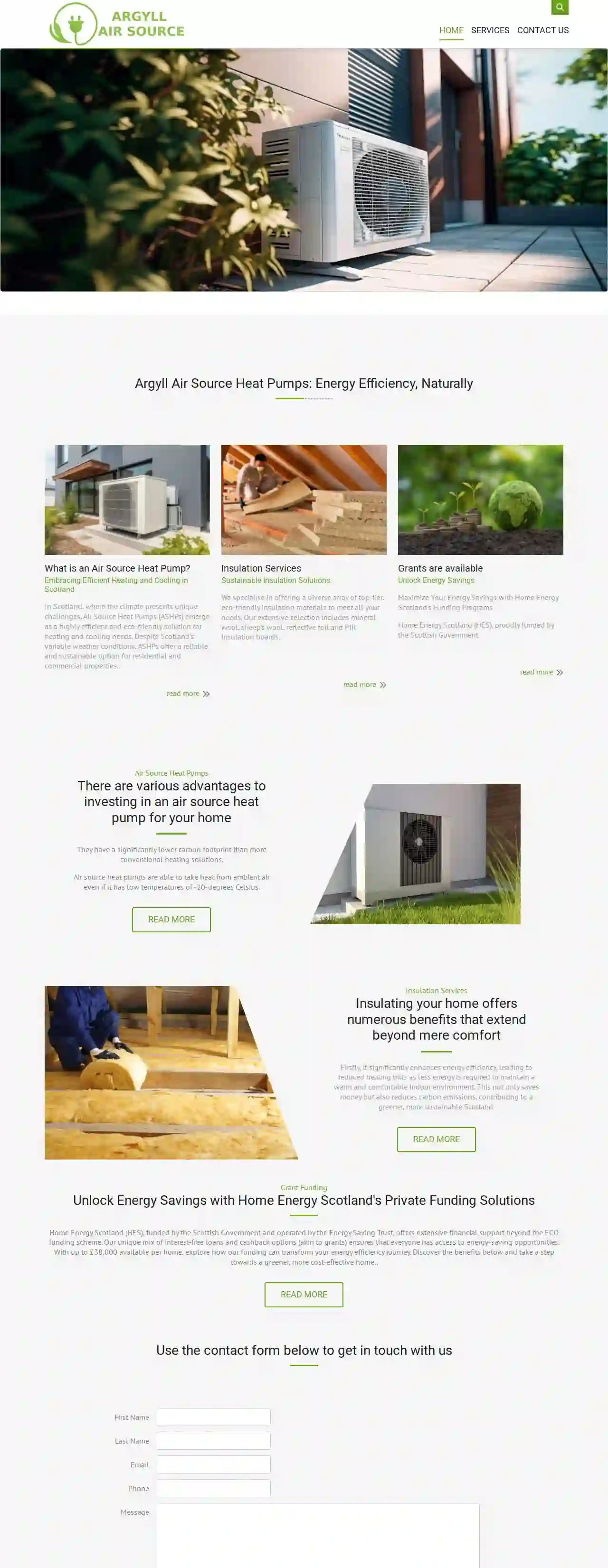
Argyll Air Source
Ayr, GBArgyll Air Source Heat Pumps is dedicated to providing energy-efficient and eco-friendly heating and cooling solutions in Scotland. We understand that Scotland's climate presents unique challenges, and that's why we offer reliable and sustainable options for both residential and commercial properties. Our team of experts specializes in a range of top-tier, eco-friendly insulation materials, including mineral wool, sheep's wool, reflective foil, and PIR insulation boards. We also provide information and guidance on grant funding opportunities available through Home Energy Scotland, a program proudly funded by the Scottish Government. Investing in an air source heat pump offers numerous advantages, including a significantly lower carbon footprint compared to traditional heating systems. These pumps can extract heat from ambient air, even at low temperatures as low as -20 degrees Celsius. Insulating your home provides numerous benefits beyond comfort, significantly enhancing energy efficiency and reducing heating bills. This not only saves money but also contributes to a greener, more sustainable Scotland. Home Energy Scotland (HES), funded by the Scottish Government and operated by the Energy Saving Trust, offers extensive financial support beyond the ECO funding scheme. With a unique mix of interest-free loans and cashback options, HES ensures everyone has access to energy-saving opportunities. Up to £38,000 is available per home, helping you transform your energy efficiency journey. Contact us today to learn more about how we can help you achieve a greener and more cost-effective home.
- Services
- Why Us?
- Gallery
Get Quote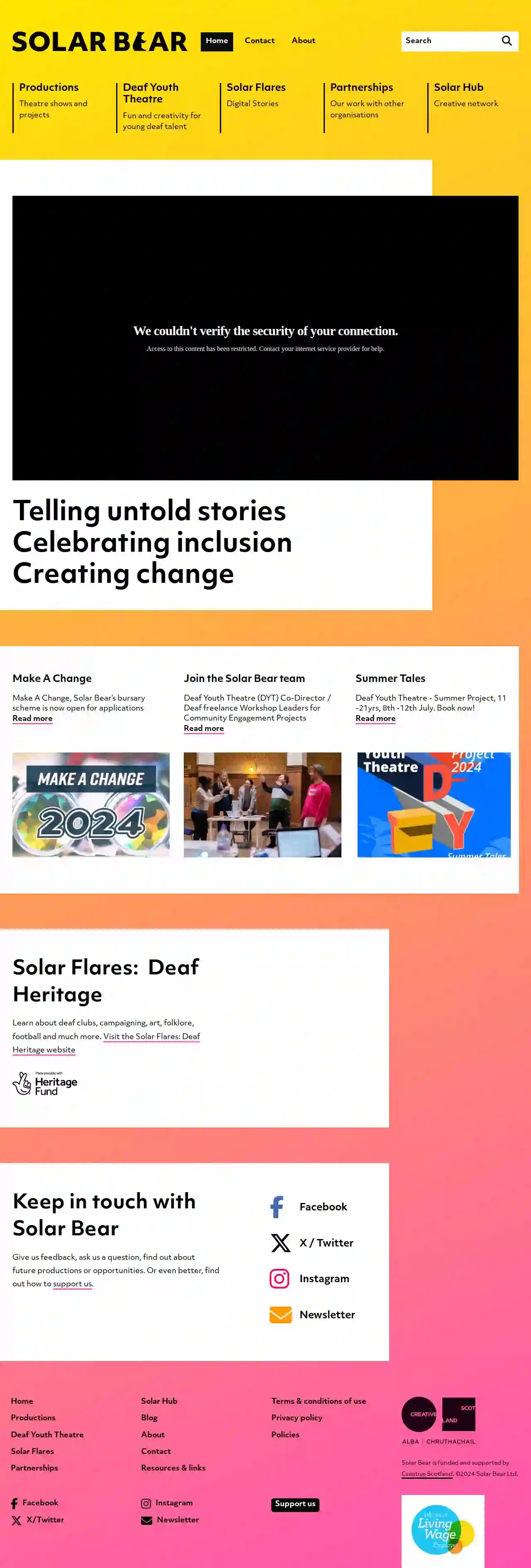
Solar Bear
51 reviews10 Cambridge Street, Edinburgh, The Traverse Theatre, EH1 1EE, GBSolar Bear is a theatre company that produces and promotes deaf-led and inclusive theatre. We believe that everyone deserves to have their stories told and to be able to access and engage with the arts. Our productions are designed to be accessible to deaf and hearing audiences alike, and we work closely with deaf artists and communities to ensure that our work is authentic and representative. We are funded and supported by Creative Scotland and are committed to creating a more inclusive and diverse arts sector.
- Services
- Why Us?
- Accreditations
- Gallery
Get Quote
Waxman Energy Ltd
56 reviewsGrove Mills, Elland, HX5 9DZ, GBWaxman Energy is a leading provider of solar PV systems, battery storage, inverters, EV chargers, mounting systems, and PV accessories. We offer a wide range of products from top brands, including Canadian Solar, Chint, Clenergy, Eastron, Emlite, GSE, Hookstop, IMO, Kraus & Naimer, libbi, Longi Solar, myenergi, Phono Solar, Solar Flash, Solax, Stäubli, Sungrow, Sunsynk, Suntech, Tigo, Tlian, Trina Solar, Triple Power, and Unbranded. Our team of experts is dedicated to providing our customers with the highest quality products and services. We offer a comprehensive range of services, including design, installation, commissioning, and maintenance. We are committed to providing our customers with a seamless and hassle-free experience. Waxman Energy is a family-owned and operated business with over 20 years of experience in the renewable energy industry. We are passionate about providing our customers with clean, sustainable energy solutions. We are proud to be a part of the Waxman Group, a leading provider of energy solutions. Our mission is to make clean energy accessible to everyone. We are committed to providing our customers with: The highest quality products Expert advice and support Competitive pricing A seamless and hassle-free experience
- Services
- Why Us?
- Gallery
Get Quote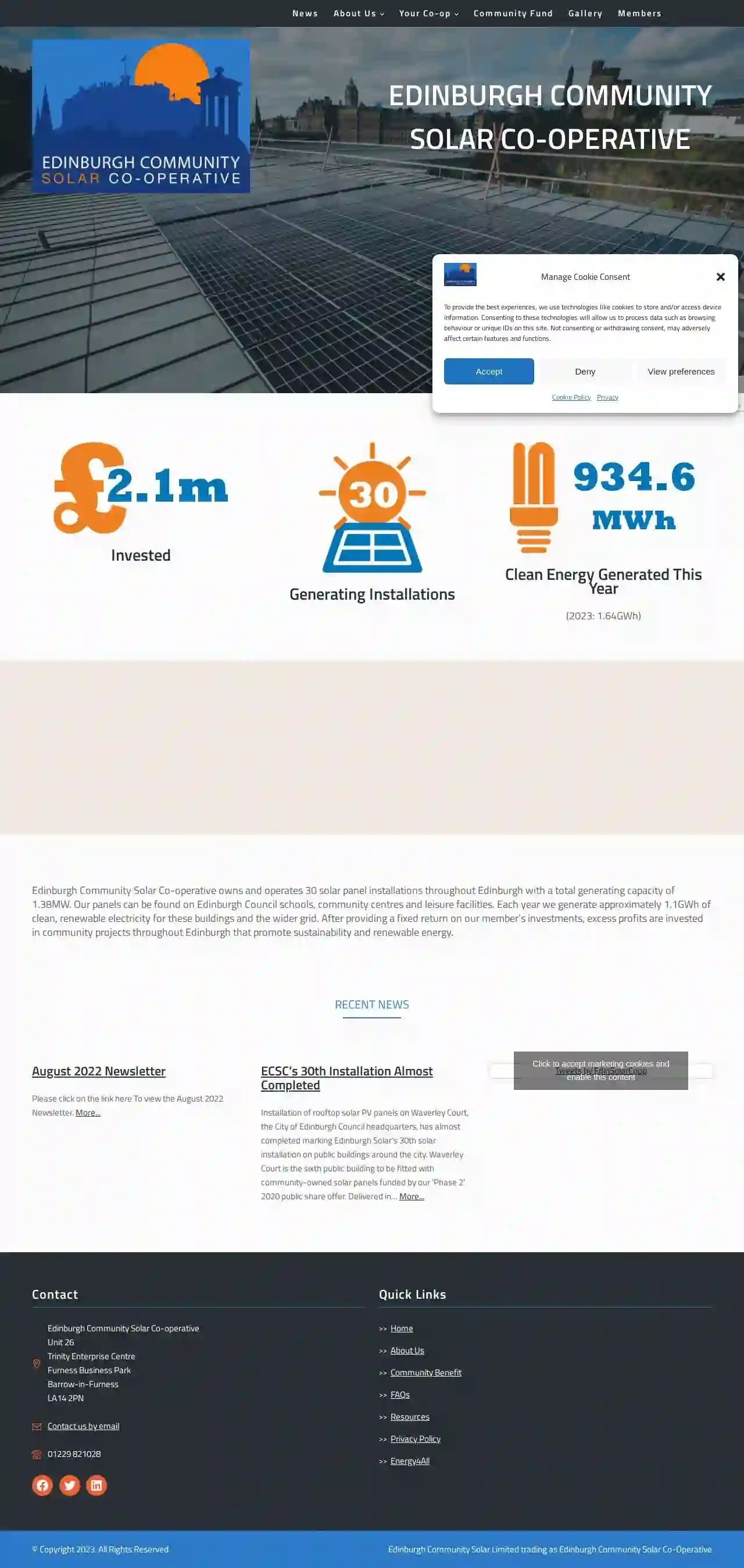
Edinburgh Community Solar Limited
Trinity Enterprise Centre, Furness Business Park, Unit 26, Barrow-in-Furness, LA14 2PN, GBEdinburgh Community Solar Co-operative owns and operates 30 solar panel installations throughout Edinburgh with a total generating capacity of 1.38MW. Our panels can be found on Edinburgh Council schools, community centres and leisure facilities. Each year we generate approximately 1.1GWh of clean, renewable electricity for these buildings and the wider grid. After providing a fixed return on our member’s investments, excess profits are invested in community projects throughout Edinburgh that promote sustainability and renewable energy. Generating Installations 1.6 GWh Clean Energy Generated Each Year RECENT NEWS August 2022 Newsletter Please click on the link here To view the August 2022 Newsletter. More... ECSC’s 30th Installation Almost Completed Installation of rooftop solar PV panels on Waverley Court, the City of Edinburgh Council headquarters, has almost completed marking Edinburgh Solar’s 30th solar installation on public buildings around the city. Waverley Court is the sixth public building to be fitted with community-owned solar panels funded by our ‘Phase 2’ 2020 public share offer. Delivered in… More... Contact Edinburgh Community Solar Co-operative Unit 26 Trinity Enterprise Centre Furness Business Park Barrow-in-Furness LA14 2PN Contact us by email 01229 821028 Facebook Twitter LinkedIn Quick Links Home About Us Community Benefit FAQs Resources Privacy Policy Energy4All © Copyright 2023. All Rights Reserved. Edinburgh Community Solar Limited trading as Edinburgh Community Solar Co-Operative Manage Cookie Consent To provide the best experiences, we use technologies like cookies to store and/or access device information. Consenting to these technologies will allow us to process data such as browsing behaviour or unique IDs on this site. Not consenting or withdrawing consent, may adversely affect certain features and functions. Functional Functional Always active The technical storage or access is strictly necessary for the legitimate purpose of enabling the use of a specific service explicitly requested by the subscriber or user, or for the sole purpose of carrying out the transmission of a communication over an electronic communications network. Preferences Preferences The technical storage or access is necessary for the legitimate purpose of storing preferences that are not requested by the subscriber or user. Statistics Statistics The technical storage or access that is used exclusively for statistical purposes. The technical storage or access that is used exclusively for anonymous statistical purposes. Without a subpoena, voluntary compliance on the part of your Internet Service Provider, or additional records from a third party, information stored or retrieved for this purpose alone cannot usually be used to identify you. Marketing Marketing The technical storage or access is required to create user profiles to send advertising, or to track the user on a website or across several websites for similar marketing purposes. Manage options Manage services Manage vendor_count vendors Read more about these purposes Accept Deny View preferences Save preferences View preferences title title title Manage consent
- Services
- Why Us?
- Gallery
Get Quote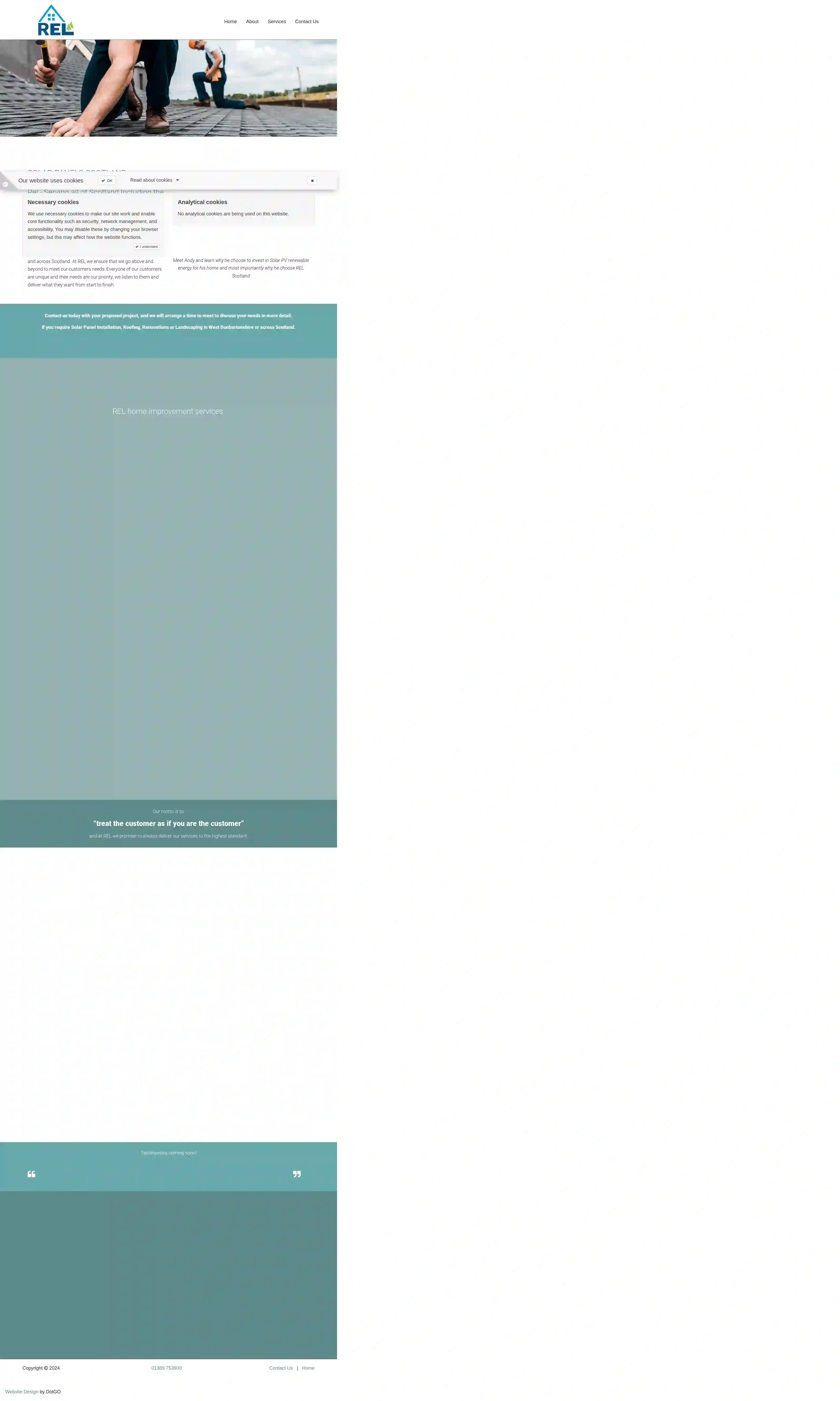
REL Scotland
51 reviews60 High Street, Newmilns, KA16 9EA, GBREL Scotland Ltd. is a team of vastly experienced, reliable, hard working and dependable professionals based in Alexandria in West Dunbartonshire, serving customers locally and across Scotland. We specialize in solar panel installations, roofs, renovations and landscapes. At REL, we go above and beyond to meet our customers' needs. We listen to each customer's unique requirements and deliver what they want from start to finish. We install solar panels throughout Scotland, including the highlands and islands. Our motto is to 'treat the customer as if you are the customer' and we promise to always deliver our services to the highest standard. Why choose REL Scotland? * **Quality service:** We promise a better service from start to finish. We will listen to you at every stage, making sure that your home improvements are of the style and standard you envisaged. * **Competitive prices:** We have the experience and know-how to perform our work quickly and to a good standard first time, reducing time spent and enabling us to pass these savings on to you. * **High quality materials:** Whatever building and landscaping work we are undertaking, we always make sure to use quality materials and equipment, so your home improvements are durable and completed to the highest standard. * **All work is guaranteed:** We guarantee the quality of our work, and will carry out remedial repairs in the unlikely event of any being necessary during the duration of our guarantee. We are also fully insured. * **Experienced professionals:** All our tradespeople have experience in their profession and are time-served craftspeople who know their work inside and out.
- Services
- Why Us?
- Gallery
Get Quote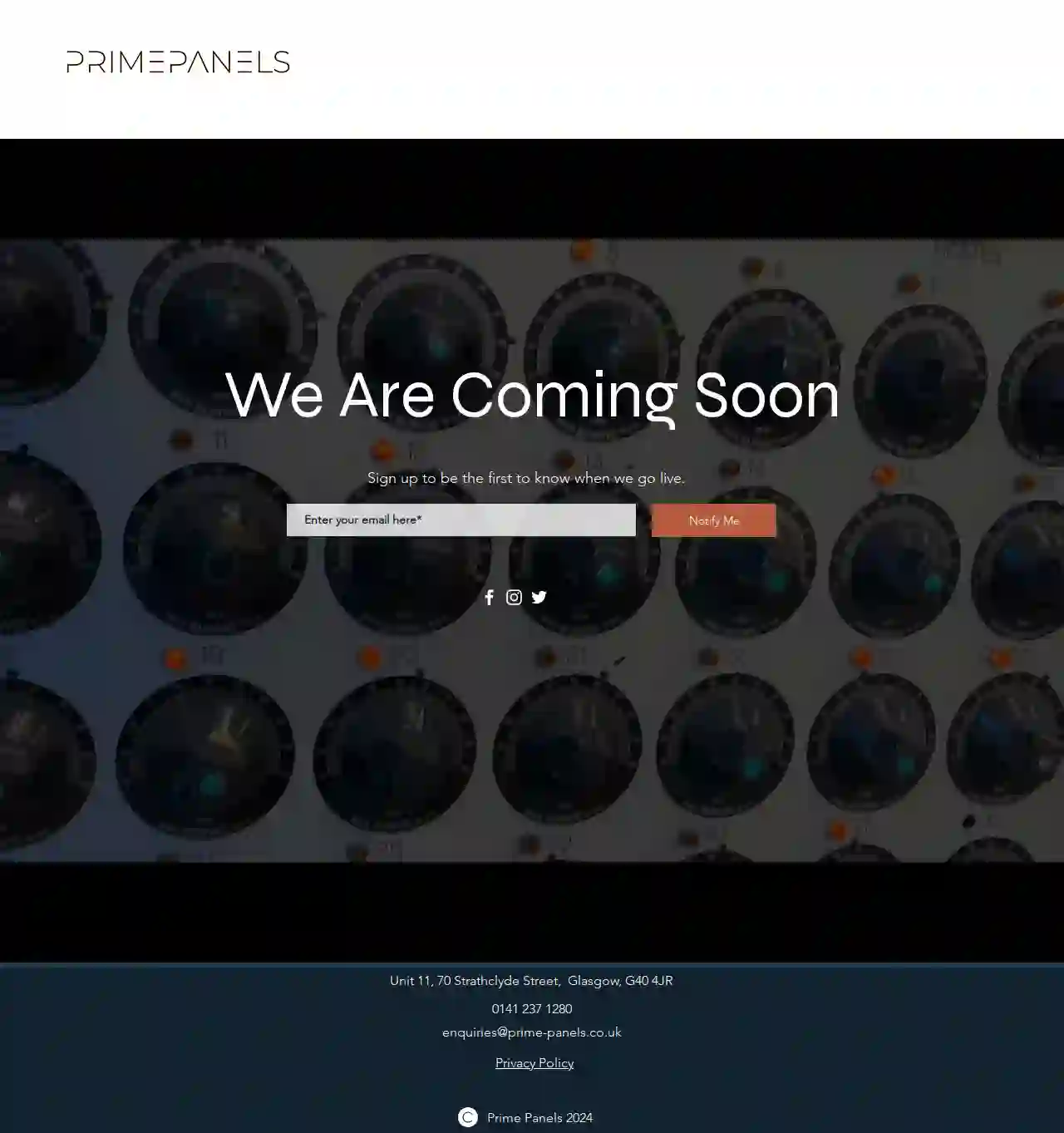
RCH Energy
Unit 11, 70 Strathclyde Street, Glasgow, G40 4JR, GBPrime Panels are coming soon! We are a team of experts dedicated to providing high-quality UPVC panels for all your needs. We pride ourselves on our commitment to customer satisfaction and our ability to deliver exceptional results. Stay tuned for our launch date and be the first to know about our exclusive offers.
- Services
- Why Us?
- Gallery
Get Quote
Social Energy
Oxford Science Park, Edmund Halley Road, The Hayakawa Building, Oxford, OX4 4GB, GBEnergise Your Future: Smarter Energy, Greener Tomorrow. Check out our latest video which describes how the Levelise hub optimises home battery storage and generates year-round revenue streams for homeowners. Be a Force for Change At Levelise, our goal is to drive a fair transition to net zero emissions, ensuring everyone benefits. Our hub lets you make the most of your battery, creating a sustainable future for us all. Getting Started How It Works Step one Solar panels generate renewable energy from the sun Step two Battery stores any excess generation not consumed on site Step three App provides insights on savings and allows you to get paid for trading in energy markets Step four Hub optimises your system and decides what’s more economical for you Download the Levelise app *Any flexibility payments and predicted savings are based on the historical performance of customers that have been operational for at least 36 months since joining. Prices do not include tax, delivery, installation, or other costs and fees. Final price will be provided by a Certified Installer.Third party logos and brand names are used for information purposes only and do not necessarily indicate affiliation with Levelise.Levelise Limited is registered in England and Wales. Company number: 10653159, Levelise® is a registered Trademark of Levelise Limited© 2023 Levelise Limited, All rights reserved.
- Services
- Why Us?
- Gallery
Get Quote
Over 3,485+ Solar Companies on our platform
Our solar pros operate in Stevenston and beyond!
SolarCompaniesHub has curated and vetted the Best Solar Companies in Stevenston. Find the most reliable contractor today.
Frequently Asked Questions About Solar Installers
- Monocrystalline: Made from a single silicon crystal, known for high efficiency (typically 18-22%) and sleek black appearance.
- Polycrystalline: Made from multiple silicon crystals, slightly less efficient (15-17%) but often more affordable than monocrystalline.
- Thin-film: Made from thin layers of photovoltaic material, lower efficiency (8-12%) but can be flexible and lightweight.
- Analyze your energy bills
- Assess your roof's suitability
- Calculate your potential solar energy generation
- Recommend a system size that meets your needs and goals.
- String Inverters: Connect multiple panels in a series (a 'string'). A cost-effective option for simple systems, but a single panel issue can affect the entire string.
- Microinverters: Attach to each individual solar panel, maximizing energy production even if some panels are shaded. They are more expensive but offer greater efficiency and monitoring capabilities.
- Power Optimizers: Similar to microinverters, but less expensive. They optimize the output of each panel and provide individual panel monitoring, but a central inverter is still required.
- Hybrid Inverters: Combine a solar inverter with a battery charge controller, allowing for seamless integration of battery storage.
What are the different types of solar panels?
What is net metering, and how does it work?
How do I choose the right solar panel system size for my needs?
What are the different types of solar inverters?
What are the different types of solar panels?
- Monocrystalline: Made from a single silicon crystal, known for high efficiency (typically 18-22%) and sleek black appearance.
- Polycrystalline: Made from multiple silicon crystals, slightly less efficient (15-17%) but often more affordable than monocrystalline.
- Thin-film: Made from thin layers of photovoltaic material, lower efficiency (8-12%) but can be flexible and lightweight.
What is net metering, and how does it work?
How do I choose the right solar panel system size for my needs?
- Analyze your energy bills
- Assess your roof's suitability
- Calculate your potential solar energy generation
- Recommend a system size that meets your needs and goals.
What are the different types of solar inverters?
- String Inverters: Connect multiple panels in a series (a 'string'). A cost-effective option for simple systems, but a single panel issue can affect the entire string.
- Microinverters: Attach to each individual solar panel, maximizing energy production even if some panels are shaded. They are more expensive but offer greater efficiency and monitoring capabilities.
- Power Optimizers: Similar to microinverters, but less expensive. They optimize the output of each panel and provide individual panel monitoring, but a central inverter is still required.
- Hybrid Inverters: Combine a solar inverter with a battery charge controller, allowing for seamless integration of battery storage.